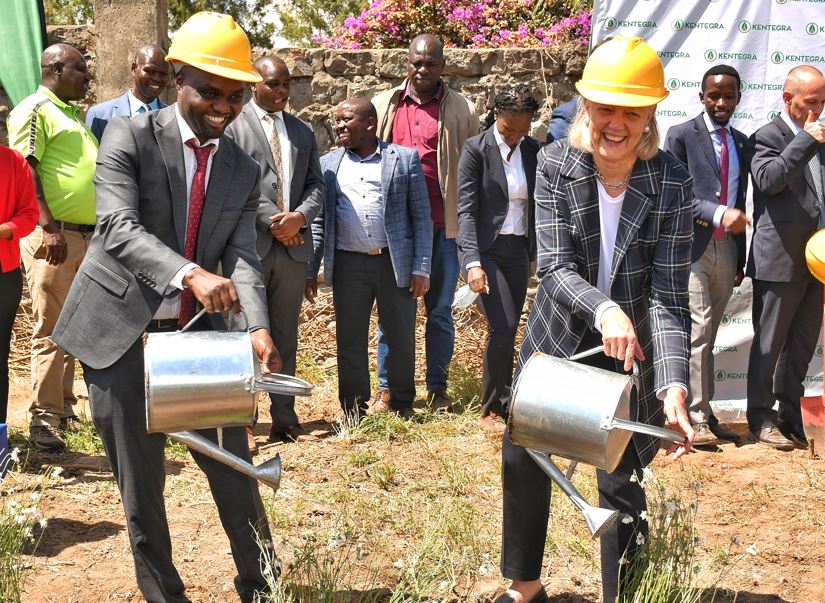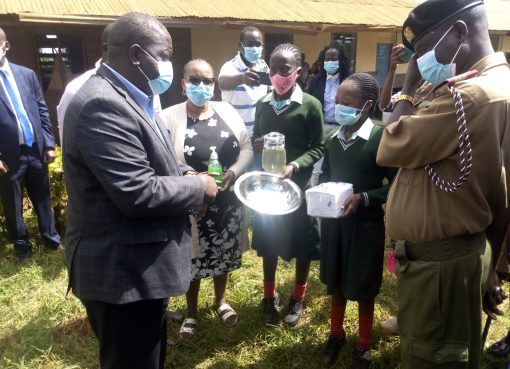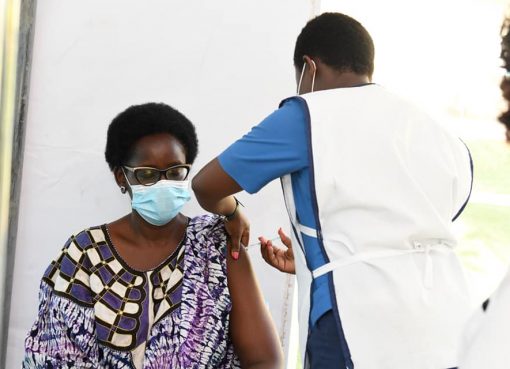The pyrethrum sector in Nakuru and the country has received a boost after an American company, Kentegra Biotechnology, embarked on the construction of an ultra-modern processing plant in Nakuru that will create 600 direct jobs.
Once completed, the factory is expected to process over 300,000 tonnes of pyrethrum by the end of this year and more than 750,000 tonnes by the year 2025.
Speaking during the groundbreaking ceremony for the construction of the Kentegra Biotehc pyrethrum factory in Naivasha on Monday, United States Ambassador to Kenya, Margaret ‘Meg’ Whitman, said the US Government, through the US International Development Finance Corporation, has funded the construction of the factory at a cost of 10 million US dollars (Sh1.4 billion).
She further revealed that the US Agency for International Development (USAID) also granted Kentagra Biotech a grand of 600,000 US dollars (Sh. 84.7 million) for a feasibility study for the factory and has in total extended a total of 12,000 US dollars (Sh. 1.69 billion) to the company for the pyrethrum project in Kenya.
The Ambassador affirmed Kenya as the US’ preferred investment destination, adding that her Government is committed to seeing Kenya succeed in industrialization to become Savannah`s Silicon Valley.
The company will be located opposite the Delamere stop shop along the Naivasha-Nakuru highway and will sit on a 12-acre piece of land dubbed the New Vasha Special Economic Zone. It is set to commence its operations by early next year.
Nakuru Governor Susan Kihika welcomed the move, saying pyrethrum farming is a flagship project through which her government envisions pyrethrum becoming our farmers’ main income-generating crop.
“To us in Nakuru County, Pyrethrum is grown in eight of 11 Sub-counties, which include Molo Kuresoi North, Kuresoi South, Njoro, Gilgil, Naivasha, Bahati, and Subukia. Even though the potential for pyrethrum farming stands at 30,000 acres of land, currently only 2,148 acres of land are under pyrethrum farming.”
To this end, the Governor said the County Government of Nakuru and other stakeholders have distributed more than 66 million seedlings to farmers since 2017, and more than 7,056 farmers have benefited, all in a bid to help the county reach its potential in pyrethrum farming. They have also mobilized farmers to form cooperatives and pyrethrum growers’ associations in order to reap maximum benefits from pyrethrum farming.
“Our resolve as Nakuru County Government to restore pyrethrum as the commercial booster crop is driven by the fact that a decade ago, Kenya used to account for 80 per cent of all pyrethrum bought by international companies but is now only accounting for five per cent as we face challenges with inadequate funding, inadequate planting materials, competition from higher-value crops, post-harvest losses, poor pricing, high labour costs, pests and diseases, and poor infrastructure,” the governor said.
Kihika added that to turn the tide and place pyrethrum farming on an upward trajectory, the county government, in collaboration with other players, has provided seedlings to farmers and sought to build capacity in good agricultural activities to promote production.
She observed that in addition, her government is promoting contract farming between farmers and processors Kentegra, such as Pyrethrum Processing Company of Kenya (PPCK) and Africhem Botanicals, ensuring timely payment of farmers and extension services, and providing farmers with modern dryers in partnership with stakeholders such as Good People International.
“We are also encouraging farmers to embrace climate-smart technologies to mitigate against drought, mobilizing farmers into cooperatives for bargaining power, fast-tracking the pyrethrum industry policy, revisiting the legal implications of ownership of PPCK assets, and attracting investors by easing doing business in the county,” the governor stated.
The revival of the crop with a ready market will help eradicate poverty and boost the livelihoods of local communities. His county is one of the biggest pyrethrum-growing areas in the country.
In a bid to attract investors to help the county in its mission of lining agriculture and industry, Nakuru County is taking adequate measures to create a business-friendly environment.
In January, the County Government of Nakuru entered into a collaboration agreement with the United States of America to promote agriculture, technology transfer, trade, and investment opportunities that could transform the livelihoods of the residents.
Kenya became the most important supplier to the American market in 1940, shipping the flower in its dry form for processing in America to make a liquid, which was and still is the basis of the best household insecticide.
In the 1990s, pyrethrum was the third-largest Kenyan export crop, providing an income to over 200,000 smallholder farmers in the country who controlled over 90 percent of the world pyrethrum market, while today its share is two per cent.
Along the way, pyrethrum production in the country declined from a high of 18,000 tonnes in 1992 to the current national production of less than 500 metric tons per year. At that point in 1993, supporting 200,000 farmers provided a livelihood to more than two million people.
However, in the mid-1990s, the growing use of synthetic insecticides in America (Kenya’s largest market), affected Kenyan pyrethrum growth.
The counties where the crop is grown are Nakuru, Narok, Nyandarua, Nyeri, Meru, Laikipia, West Pokot, Uasin Gishu, Elgeyo-Marakwet, Nyamira, Kisii, Bomet, Kericho, Kiambu, Trans Nzoia, Murang’a, Kirinyaga, and Bungoma.
Area MP Jayne Kihara, who was present, welcomed this move, saying the revival of pyrethrum farming will empower local farmers economically and boost their livelihoods.
Kentegra Biotechnology is among the privately owned firms that were granted a permit to help revitalize the pyrethrum sector in Kenya and is currently operating in over six counties with over 10,000 contracted farmers. Several companies were also granted permits to extract, process, and sell pyrethrum products when the industry was liberalized seven years ago.
Other private pyrethrum processors who have been issued permits are Africhem Botanicals, Pypro, and HighChem. The entry of private companies breaks the monopoly that was enjoyed by the State-owned Pyrethrum Processing Company of Kenya in Nakuru.
Kentegra Biotech is using a new variety of pyrethrum that produces a flower every two weeks for 10 months in the year instead of a flower variety that grows once a year, which is preferred by developed nations.
The locally grown pyrethrum, which has been researched and developed in partnership with the University of Eldoret, is drought-resistant, blooms all year around, and promises three times more income than other competing crops.
By Mabel Keya-Shikuku and Erastus Gichohi





